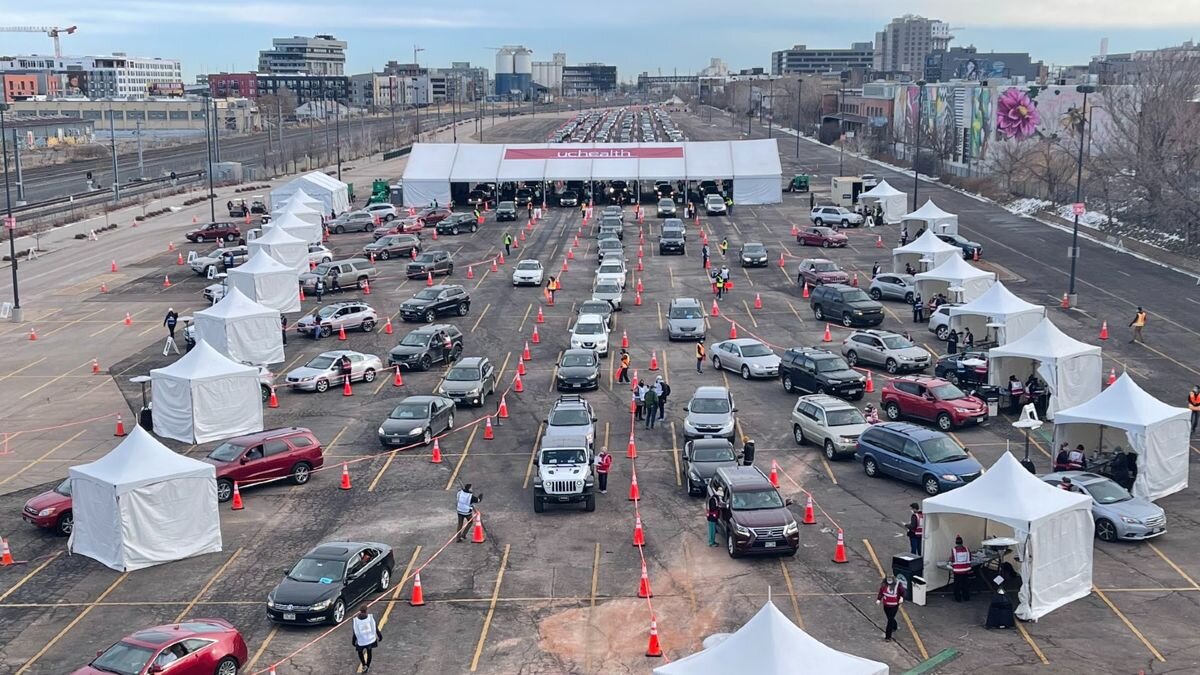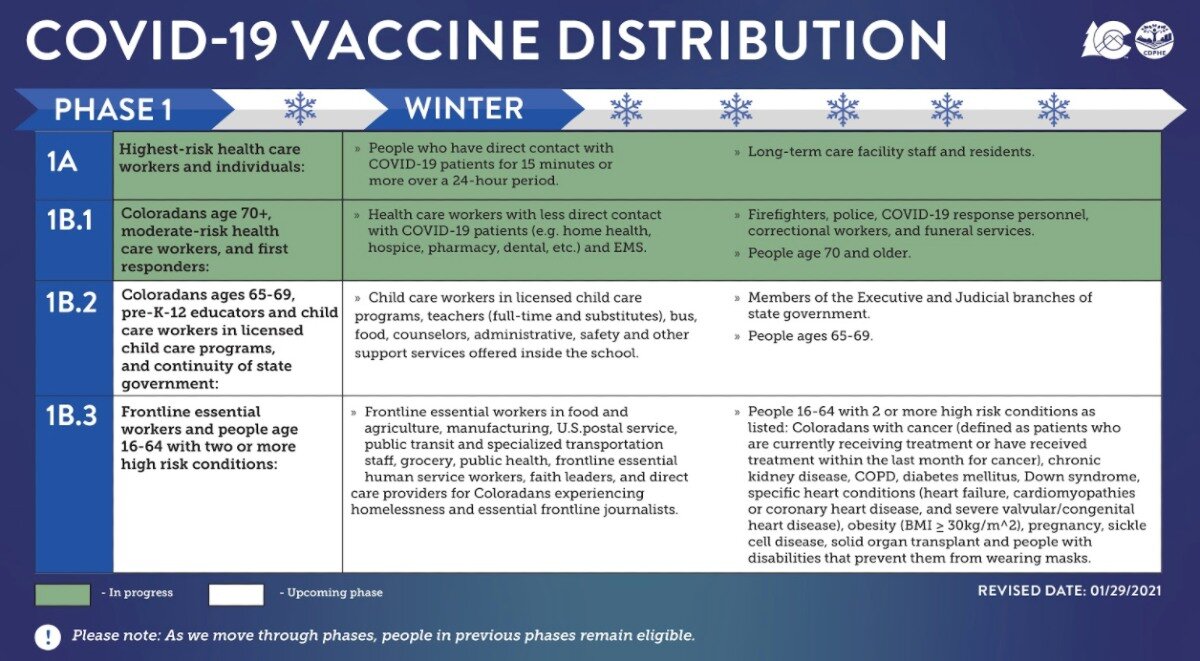Governor Polis receives COVID-19 vaccine; thousands of seniors get dose at Coors Field

DENVER — As thousands of Colorado senior citizens reported to Coors Field Saturday, January 30 to receive their COVID-19 vaccines, Governor Jared Polis and First Gentleman Marlon Reis arrived at Salud Clinic in Commerce City to get their first doses of the vaccine.
"I’m putting my arm where my mouth is," the governor told a group of patients at Salud Clinic.
Polis received the Moderna vaccine. According to The Colorado Sun, the governor is one of 200 people who were given priority access to ensure continuity of government.
“Really? I didn’t even really feel it," Polis said after receiving his shot. "That was amazing. That was easy."
Polis and Reis’ vaccination comes roughly two months after the couple tested positive for COVID-19 on November 28, 2020. Polis never faced more than mild symptoms, however Reis was hospitalized for two days after experiencing a worsening cough and shortness of breath.
A day before receiving a vaccine of his own, Polis announced that teachers and Coloradans 65 and older would be eligible for vaccines beginning February 8.
“Every vaccine administered is one step closer to ending the pandemic,” Polis said.
Having vaccinated at least 90% of high risk health care workers and nearly 100% of the state’s long-term care facilities, Colorado’s current priority is vaccinating the 70+ population. Public health officials have a goal of vaccinating 70% of the 70+ population by the end of February. On Friday, Polis said they are on track to meet that goal. The drive-through event at Coors Field should help.
Approximately 10,000 seniors received a dose of the COVID-19 vaccine at the parking lot adjacent to Coors Field this weekend. The event was organized by UCHealth. Dr. Richard Zane is the chief innovation officer at UCHealth. He said during a trial run the previous weekend, in which 1,000 seniors were vaccinated in the parking lot, the longest anyone had to wait in their car was 26 minutes.
Marge Taylor, 87, was one of the many people to receive a vaccine Saturday, January 30. Her son, Jack, drove her to the event at Coors Field.
"We received a notification a few days ago that she could receive the vaccine today and I immediately signed her up. This is super exciting and I feel like as a society we are finally on the path to getting everything back to normal," Jack said. "We’ve stayed very limited on where we go and what we do because I don’t want to expose anyone, so for people to finally start getting the vaccine is incredible."

More information on the vaccine in Colorado, including data on how many people have been vaccinated and what phase we’re in, is available here.
Eligible Coloradans are encouraged to register for a vaccine by going to cocovidvaccine.org. Alternatively, they can call the new vaccine hotline at 1-877-CO VAX CO (1-877-268-2926).
After vaccinating the 70+ population, Colorado will move onto Phase 1B.2, which prioritizes residents ages 65 to 69 as well as educators and school staff. Vaccines for this group will be available starting February 8.

Scott Bookman, incident commander with CDPHE, said there are roughly 408,100 Coloradans included in Phase 1B.2. CDPHE wants to vaccinate at least 55% of that group by March 8.
Phase 1B.2 also takes into account about 100 vaccines for “members of the Executive and Judicial branches of state government.”
After Phase 1B.2 comes Phase 1B.3, which includes by far more Coloradans than any previous phase. During Phase 1B.3, front line essential workers (grocers, postal workers, public health employees and faith leaders, to name a few groups) as well as all Coloradans ages 16 to 64 with two more comorbidities will be eligible to receive a vaccine.
Phase 1B.3 includes an estimated 1.1 million people, 750,000 of which are front line workers.
The Colorado Department of Public Health and environment also announced January 30 that it is seeking community input before updating the state's COVID-19 dial dashboard.
“Coloradans have made significant sacrifices to reduce disease transmission, so it is time to update the dial to reflect this reality, plus the increasing number of people who are immunized,” CDPHE Executive Director Jill Hunsaker Ryan said in a press release. “This updated proposal is based on Colorado's disease and vaccination rates, plus input from local public health agencies and local governments, and we are seeking the public's help to refine it further.”
According to CDPHE, Draft changes include:
- An increase in the range of incidence metrics for all colors to better balance disease suppression with economic hardship, while preventing a breach in hospital capacity.
- Moving to a 7-day metric of incidence rate, percent positivity of testing, and hospitalizations instead of a 14 day metric to more quickly respond to local conditions
- Decreasing the metric requirement for testing positivity rates in the yellow and orange levels to continue to promote testing as an important disease containment strategy.
- Special consideration from CDPHE for counties under 20,000 population to determine the level on the dial, accounting for weekly variability in the percent positivity of tests and disease incidence rates.
People who wish to provide feedback on the draft can do so here.
Zane believes that UCHealth has the capacity to vaccinate 8,000 people per day, but that limited vaccine supply is their greatest challenge. Polis has said that Colorado has the capacity to use three or four more times vaccines than the state is currently receiving.
“The entire purpose of this [drive-through event] is to get Colorado back to normal,” Zane said. “Getting vaccinated is not just an individual choice for your own health, but it’s also a societal obligation. The faster and broader we vaccinate, the faster we get back to normal.”